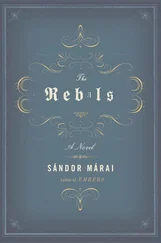“In the tropics,” asks the General politely, “did you sometimes play the Polonaise-Fantaisie?” They are now eating the beef, savoring it with real appetite, concentrating as they chew in the way of old for whom eating is no longer merely the ingestion of nourishment but has become a ceremonial and archaic ritual.
They chew and swallow as if deliberately gathering strength, because strength is essential if they are to act, and strength can be drawn from rare-roasted meat and rich, dark wine. Their jaws work audibly and with absolute purpose, as if table manners have ceased to count and what matters is to masticate every shred of beef, draw out its store of energy and put it to use. Their gestures may be elegant, but they eat like tribal elders at a feast: unstoppably and without restraint.
From his corner the majordomo keeps an anxious eye on one of the servants who is in the act of using both hands to balance a large tray laden with chocolate ice cream wreathed in a tongue of bluish-yellow flame from the ignited alcohol.
The other servants pour champagne for the guest and his host. The two old men sniff the wine knowledgeably as it pours from the great bottle that is almost as large as a baby.
The General tastes it, then pushes his glass away and signals that he would like more red wine. The guest watches the gesture, blinking a little. Both men are flushed from all the food and drink.
“In my grandfather’s day,” says the General, looking at the wine, “a quart of ordinary wine was set in front of every guest as his individual portion. Ordinary table wine. My father told me that even the King had his guests served with crystal carafes of ordinary table wine, one each.
It was called table wine because it stood on the table and each guest could drink as much as he wanted. Vintage wines were served separately.
That was how wines were served at court.”
“Yes,” says Konrad, his face flushed, busy digesting “Everything was well ordered in those days,” he add blandly.
“He sat here,” says the General as if in passing, his eyes indicating the King’s place at the center of the table. “My mother to his right, the priest to his left. He sat in this room in the place of honor. He slept upstairs in the yellow bedroom. And after dinner he danced with my mother,” he says softly, his voice passing through old age and back to second childhood as h remembers. “Do you see, there’s no one with whom one can talk about such things anymore. Which is another reason that I’m glad you came back,” he says with utter sincerity. “Once you played the Polonaise-Fantaisie with my mother. Did you not play it again later, in the tropics?” he asks again, as if he had just remembered what was really important.
The guest thinks for a moment. “No. I never played Chopin in the tropics. You know, this music sets loose lot of things in me. The tropics make one more vulnerable.” Now that they have eaten and drunk, the formality and uneasiness of the first half-hour have dissipated.
The blood flows hotter in their hardened arteries, and the veins stand out on their temples and foreheads. The servants bring fruit from the hothouse. They eat grapes and medlars. The room has warmed up, and the evening breezes ruffle the gray curtains at the half-open windows.
“We could have our coffee on the other side,” says the General. At that moment a violent gust of wind pushes open the windows, the curtains begin to blow, and even the heavy crystal chandelier starts swaying as if it is in a ship in a storm. The sky lights up for a moment and a sulfurous yellow bolt of lightning slices down through the night like a golden dagger impaling the body of the sacrifice. The storm is already loose in the room, extinguishing the frantic flames of the candles; suddenly it is dark. The majordomo hurries to the window and, groping in the blackness with the help of two servants, finds and closes both wings of the French doors. Then they see that the town, too, has gone dark.
The lightning has struck the municipal electric station. They sit in silence in the dark, the only light coming from the fireplace and two candles which have not blown out. Then the servants arrive with more lights.
“The other side,” the General repeats, quite untroubled by either the lightning or the darkness.
A servant lifts a candelabra and leads the way.
Silently, wobbling a little like shadows on a wall, they walk in this ghostly glow from the dining room through one cold salon after another until they reach: a room whose only furniture consists of a grand piano with its lid raised and three chairs around a great-bellied, hot porcelain stove. They sit down and look out through the long, white curtains at the dark landscape. The servant sets the coffee on a small table along with cigars and brandy, then places the silver candelabra with the fat church candles on the ledge of the stove. They each light a cigar, and sit in silence warming themselves. The heat from the logs in the stove pours out in steady waves and the candlelight dances above their heads. The door has been closed. They a re alone.
We don’t have long to live,” the General says abruptly, as if he were pronouncing the clinching statement in an unvoiced argument. “Another year, maybe two, perhaps not even that much. We don’t have long to live, because you came back. As you are well aware. You had plenty of time to think, in the tropics and then in your house near London. Forty-one years is a long time. You thought it all over, didn’t you? … But then you came back, because you couldn’t do anything else. And I’ve been waiting for you, because I couldn’t do anything else. And we’ve both known that we would meet again, and then it would be allover with life and everything that gave our existence meaning and tension. A secret of the kind that lurks between the two of us has extraordinary power. It burns through the fabric of life like a scorching beam, and yet at the same time it also gives it tensile strength. It forces us to live …
For as long as we still have things to do here on earth, we’ll stay alive. I am going to tell you what I went through, alone in this forest for forty-one years while you were out in the world and the tropics.
Solitude is strange too … and sometimes as filled with dangers and surprises as a virgin forest. I know all its ways. boredom against which you mount a hopeless struggle by means of an ordered life. The sudden moments of revolt. Solitude is as full of secrets as the jungle, repeats stubbornly. “You live a perfectly ordered existence, and one day you run amok, like those Malays; of yours. You have a house, a title and a rank, and a way of life that is painfully exact. And one day you run away from it all with a weapon in your hand, or not-which may be even more dangerous. You run out into world, wild-eyed, and your old friends and comrades get out of your way. You go to a city, you buy yourself women, everything around you turns to chaos, you look for fights everywhere and you find them. And, as I said, that is by no means the worst of it.
Maybe you are struck down as you run like a mangy, rabid dog. Maybe you run full-tilt into a wall, against all life’s obstacles and break every bone in your body. What’s even worse is if you take this upsurge of feeling, which has accumulated in your heart over so many lonely years, and you push it back inside. And you don’t run. And you don’t kill anyone. And what do you do instead? You live, you maintain discipline.
You live like a monk of some heathen worldly order.
But it’s easy for a real monk, because he has his belief. A man who has signed away his soul and his fate to solitude is incapable of faith. He can only wait. For the day or the hour when he can talk about everything that forced him into solitude with the man or men who forced him into that condition. He prepares himself for that moment for ten or forty or forty-one years the way one prepares for a duel. He brings his affairs into order in case he dies in the duel. And he practices every day, as professional duelists do. And what weapon does he practice with?
Читать дальше












